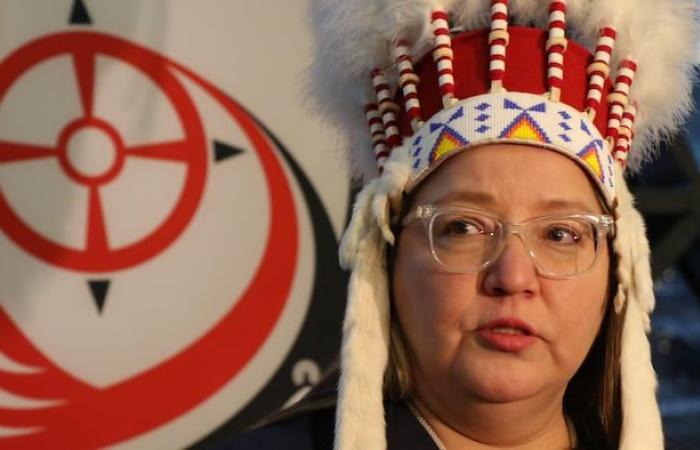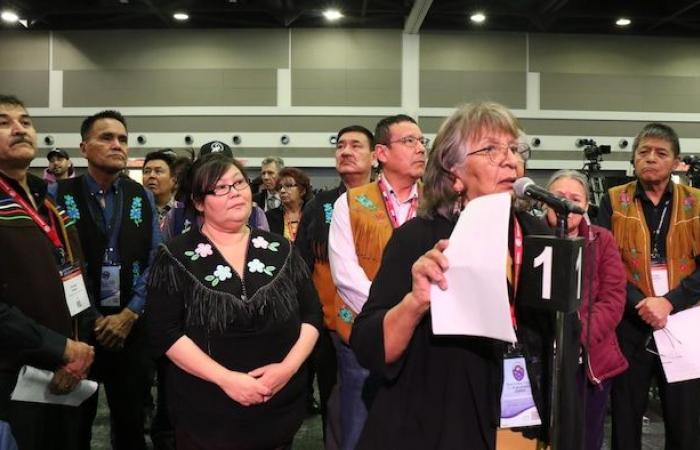As the Assembly of First Nations (AFN) and Ottawa pass the buck, Indigenous leaders meeting in Ottawa voted in favor of renegotiating the $47.8 billion draft agreement to reform long-term protection of childhood. They want the agreement to now include communities in the Northwest Territories.
The resolution, passed by a majority of chiefs, calls for the new negotiating team to be led by the First Nations Child and Family Caring Society.
Its general director, Cindy Blackstockcame to take stock of this matter critique
hammering out that Canada should never harm children again
.
The National Commission of Chiefs for Children, which is to include representatives from each region to provide strategic direction and follow-up to the negotiations, is slowly taking shape. Representatives from eight regions have been appointed. Cindy Blackstock indicated that she had already shared the progress made with an informal working group.
Last October, approximately 65% of First Nations chiefs and representatives voted against the proposed $47.8 billion agreement over 10 years negotiated between Ottawa and the Assembly of First Nations (AFN), the chiefs of Ontario and Nishnawbe Aski Nation.
The points of contention were governance, transparency, the lack of regional representation and the fact that according to several leaders and Cindy Blackstock, Canada was trying to get out of the legal obligations imposed by the Canadian Human Rights Tribunal with this agreement.
As leaders continue to show their impatience for a return to negotiations, theAPN and Ottawa pass the buck.
At the end of October, Ottawa estimated that it was now in the camp ofAPN. However, the day before the extraordinary meeting of theAPN of December, the national leader, Cindy Woodhouse Nepinakhad urged Canada to return to the negotiating table with a new mandate to advance long-term reform of the Indigenous child welfare system.
According to the regional head of Nova Scotia, Andrea Paul, theAPN sent a letter to the office of Indigenous Services Minister Patty Hajdu in late October, but received no response. The minister is scheduled to speak at the special meeting of the Chiefs this Thursday in Ottawa.
The resolution passed by the leaders also calls forAPN to apologize for comments that First Nations child protection agencies led a campaign against Ottawa’s offer.
Open in full screen mode
AFN Leader Cindy Woodhouse Nepinak made controversial comments in October during the vote on the agreement with the federal government.
Photo: - / Marie-Laure Josselin
In October, on the last day of the assembly, the national leader Cindy Woodhouse Nepinak had praised the work of those who worked for the draft agreement, and had also recognized the success of the campaign which caused this resolution to fail.
Finally, the Chiefs voted by a large majority to include the Northwest Territories in the final settlement agreement on compensation and long-term reform of children’s services.
The communities of T.N.-O. were not in the complaint filed before the Human Rights Tribunal in 2007 against the Government of Canada, and therefore they were not part of the $47.8 billion settlement.
Many Dene leaders traveled to Ottawa to make their voices heard, punctuating their speeches with a Mahsi Cho! (thank you very much), accompanied by applause.
It’s time to include all children. Fairness is not too much to ask
launched the national chief of the Dene Nation, and former Grand Chief Tłı̨chǫ, George Mackenzie.
The head of Salt RiverToni Heron, launched a vibrant appeal, with dozens of people behind her.
Open in full screen mode
A strong delegation of Dene leaders have lined up behind Chief Toni Heron to demand to be included in the long-term child welfare reform plan.
Photo: - / Marie-Laure Josselin
The fair and equitable inclusion of children in the Northwest Territories is a commitment to the future and a significant step in addressing the unspeakable harms inflicted in the past on our children and families living in a colonial system that does not work. just not
.
According to her, the T.N.-O. have been historically disproportionately affected by the child welfare system in Canada
.
About twenty chiefs and representatives came to the microphone to support another resolution to renew the negotiations, with certain obligations such as reporting to the Chiefs’ Commission for Children.
We must leave no one behind
recalled the chief of the Takla nation in British Columbia, John French. They want young people in particular to be consulted during discussions on reform.
The session on youth protection issues was adjourned. Discussions resume this Thursday.






